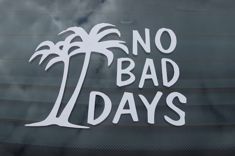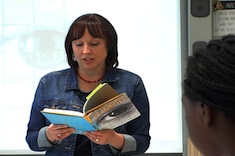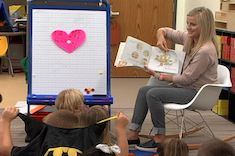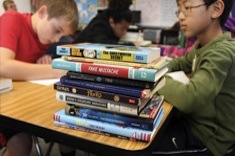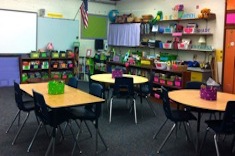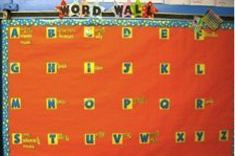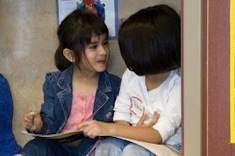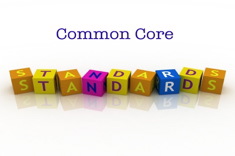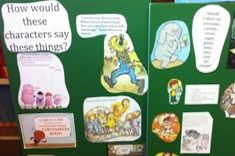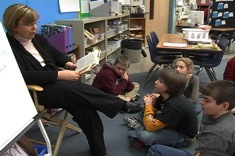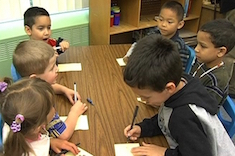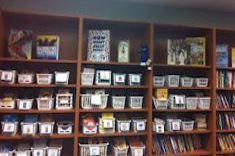Articles
Here is where you’ll find all the latest print features from our contributors. If you’d like to browse specifically by grade level, topic, or contributor, you can use the links in the right sidebar.
Latest Content
When Are Students Ready for Writers’ Notebooks?
Second grade? Third grade? Aimee Buckner breaks down what behaviors to look for if you’re trying to determine when students are ready to move from draft pages or booklets to writers’ notebooks.
More Conferring and Fewer Groups in Kindergarten
Mandy Robek finds she needs fewer reading groups and more conferring with the emergent readers in her kindergarten class. She shares how she structures her brief time with students and a conferring form.
Notes from the Mad Teachers Liberation Front: Create Your Manifesto
Start your school year off right (or get it back on track) with a manifesto about who you are and what you value. Ruth Shagoury provides a mentor poem, guidelines and samples.
Helping Middle School Readers Set Goals
In the final installment of a two-part series, Gretchen Taylor explains how to help middle school readers set goals.
Field Experience: Writers’ Notebooks
Writers’ Notebooks are an important tool for writers. Ruth Ayres designed a field experience to showcase how elementary teachers use notebooks with young writers.
Field Experience: Social-Emotional Learning in Workshop
Compassion and understanding are as important to workshop instruction as strategies and routines. Ruth Ayres compiled a field experience to highlight the way understanding the social-emotional needs of students (and ourselves) allows for safe learning environments.
Field Experience: Craft Moves for Elementary Writers
This field experience invites us to consider a handful of craft moves to teach young writers in minilessons, conferences and share sessions.
Field Experience: Classroom Tours
Spend time noticing the details that reflect beliefs and influence instruction. Ruth Ayres set up room tours for a field experience focused on more than trendy spaces.
Field Experience: Small Group Reading Instruction
Small group reading instruction is an important part of elementary literacy. This field experience is a sampling of a variety of examples.
Field Experience: Picture Books and Older Students
The value of picture books with older students is often questioned. Ruth Ayres assembled this field experience to allow insight into the depth and power of picture books for older students.
Field Experience: General Workshop Routines
This field experience invites us to consider the routines of opening the day, workshop norms, meeting areas and transitions to make workshop run smoothly.
What’s Up with Those Word Walls?
Shari Frost visits classrooms early in the year and finds many have completely full word walls. In this essay, she shares research as well as practical reasons why it’s best to build the walls over time with students.
A Perfect Storm
If you work with young children, you know these girls. Olivia is a pink princess, given to tears and fanciful tales of slights from classmates. Maggie is a tomboy who struts around in zombie t-shirts and doesn’t suffer fools gladly. The two meet like gladiators in the preschool playhouse late in the school year.
Running and Middle School Reading Goals
Gretchen Taylor helps her middle school students analyze their needs as readers and set benchmarks for growth.
Introducing the Common Core Standards in Writing (Part 2)
Heather Rader shares more guidelines for a professional development day on the Common Core with a writing focus.
Walls, Displays, and Invitations Early in the School Year
Franki Sibberson turns to museums for inspiration as she designs wall displays for the start of the school year.
Engaging Boy Readers: Beginning with Teacher Behaviors
Tony Keefer considers some of those awkward early conferences with male readers in his classroom, and shares advice on how to get the year off to a comfortable start with minilesson and conferring suggestions.
Reaching Evan with Read Alouds in the Intermediate Grades
Karen Terlecky reflects on the power of read alouds in the intermediate grades for welcoming older students who struggle with reading into the “club” of kids who love books.
Never Say Never: Motivation to Read from an Unlikely Source
Knock knock. Who’s there? A boy who loves sports and has no motivation for reading. Barclay Marcell discovers an unlikely source of engaging text for a child who just doesn’t enjoy books.
Volunteered: What I Learned from Cleaning Out the Barn
Andie Cunningham is "ticked and disgusted" when her boss volunteers her for yet another committee. Cleaning out the barn clears her head, reminding Andie of all the tools and strategies literacy leaders have for dealing with whatever is flung their way.
Introducing the Writing Common Core Standards: Planning for Professional Development
Heather Rader sorts through goals, audience, and interest in planning a day of professional development linked to the writing standards in the Common Core.
Educating the Writer’s Palate
Helping high school students understand the sophisticated literary tastes of writers is just a cookie away in Ellie Gilbert’s classroom. Ellie pairs cardamon with irony to launch the school year with a metaphor and challenge.
One Book, One School: Building Community with Shared Text
"When given the choice between being right or being kind, choose kind." These words from the book Wonder set Katherine Sokolowski on the path of designing a shared reading experience at her school that will build community and empathy across the grades.
Summer Planning: Goals and the Finish Line
Teachers always have big plans at the start of summer for reading, reflection, and changing classroom practice. Katherine Sokolowski explains how she translates those plans into action as the summer winds down.
Are Your Writers Talking During Writing Workshop?
Stella Villalba shares practical tips for helping young English language learners collaborate with classmates and receive feedback during writing workshop.
Loops and Blended Classrooms: Practical Tips to Start the School Year
It can feel like “old home week” when you have students returning to your classroom for a second year. But blending and looping both present their own special challenges during the first days of school. Melanie Quinn has advice for getting the year off to a good start.
Energy, Stamina, and Training Wheels for Coaching Teachers
Gradual release, not-so-gradual release or catch and release? Heather Sisson ponders the challenges of providing the appropriate support in a coaching cycle.
Finding a Place for Graphic Novels in My Classroom
Katherine Sokolowski listens to her husband’s sage advice and develops a new relationship with graphic novels that disappear off her classroom shelves.
The Quest for the Perfect First Read Aloud of the Year
Franki Sibberson is on a quest to find the perfect first read aloud of the year, and the search helps her consider the goals and purpose of read alouds during the first days of school.
Rethinking My Nonfiction Library in Response to the Common Core
Franki Sibberson finds a new classroom, the Common Core, and tech considerations are changing the ways she organizes the nonfiction sections of her classroom library.
Browse Content By
Type
Category
- Assessment Tools
- Big Fresh Archives
- Booklists
- Choice Numeracy
- Classroom Design
- Common Core
- Community Building
- Conferring
- Content Literacy
- Digital Literacy
- English Language Learners
- Equity
- Family Relations
- Free Samples
- Guiding Groups
- Leadership
- Literacy Coaches
- Mentor Texts
- Minilessons
- New Teacher Mentors
- Podcasts
- Poetry
- Quote Collections
- Reading Strategies
- Self Care
- Struggling and Striving Learners
- Talking and Listening
- Teacher Study Groups
- Teaching Reading
- Teaching Writing
- Word Study and Vocabulary
Author
- Melissa Quimby
- Nawal Qarooni
- Gwen Blumberg
- Julie Cox
- The Lead Learners
- Hannah Tills
- Josie Stewart
- Ruth Metcalfe
- Mallory Messenger
- Becca Burk
- Jodie Bailey
- Vivian Chen
- Mary Brower
- Tiffany Abbott Fuller
- Stephanie Affinito
- Ruth Ayres
- Leigh Anne Eck
- Heather Fisher
- Shari Frost
- Julie Johnson
- Suzy Kaback
- Gigi McAllister
- Shirl McPhillips
- Melanie Meehan
- Cathy Mere
- Debbie Miller
- Tara Barnett and Kate Mills
- Tammy Mulligan
- Dana Murphy
- Bitsy Parks
- David Pittman
- Brenda Power
- Heather Rader
- Matt Renwick
- Mandy Robek
- Christy Rush-Levine
- Gretchen Schroeder
- Jen Schwanke
- Brian Sepe
- Katherine Sokolowski
- Stella Villalba
- Jennifer Vincent
Grade Level
Choice Literacy Membership
Articles
Get full access to all Choice Literacy article content
Videos
Get full access to all Choice Literacy video content
Courses
Access Choice Literacy course curriculum and training



